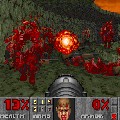Playing Violent Computer Games Might Change Children's Behaviors
The video game industry is a multi-billion dollar, worldwide enterprise that targets many of its products at teenage players. Research has hinted in the past that children who play violent computer games might experience behavioral changes. Now researchers in Indianapolis, Indiana, say exposure to violent games affects blood flow in parts of the brain that control emotions even after the game is over.
Vincent Mathews is a professor of radiology at the Indiana University School of Medicine. He took 44 adolescents and divided them into two groups. One group played a violent video game and the other group played another exciting video game that lacked violence. To measure changes in the brain, Mathews put the teens into a magnetic resonance imaging machine that measured blood flow in different areas of the brain: What we found was that the adolescents, the children who played the violent video game, demonstrated decreases in activity in the brain that is involved in behavioral monitoring and behavioral control," says Dr. Matthews. He aslo notes that the children demonstrated increases in activity in parts of the brain involved in emotional arousal. "That part of the brain," adds Vincent Matthews, "is getting us ready for 'fight or flight' response, engaging in a conflict or fleeing from a conflict." Mathews says the subject teens played a so-called 'first-person shooter' game, where the person playing the game takes on the role of someone wielding a gun and killing enemies. "This is a teen-rated game, so it's not the most, um, explicit violence, but basically, there's shooting, there are explosions, there are flashes of red indicating blood but it's not the mature-rated games that show real graphic violence," he says. Mathews says that after prior studies, video game companies have tried to refute his conclusions, but he believes the evidence is strong that violent game play can trigger significant and prolonged emotional changes in young gamers. Mathews says parents and gamers themselves should take note. "They should be concerned about how much they're playing and what kinds of things they're exposing themselves to." Vincent Mathews presented his research at the annual meeting of the Radiological Society of North America.

